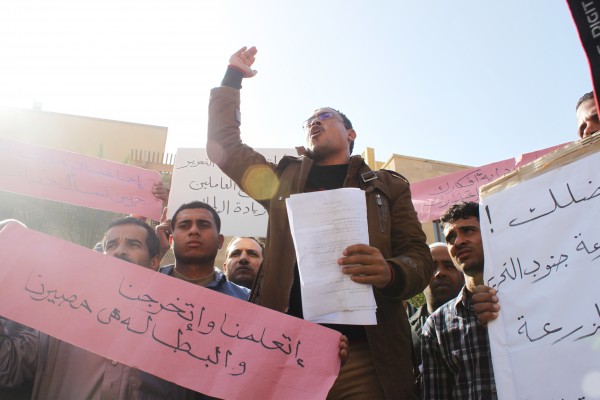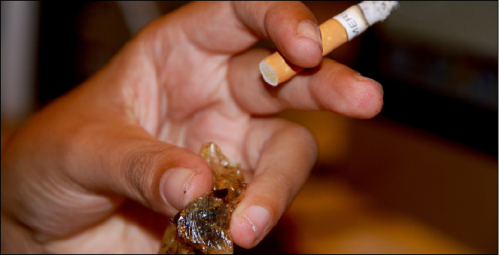Angry Reactions To Political Stances Of Egypt SU President
BY: ROQAYA ZAMZAM
Criticism of Egypt’s Student Union (SU) President, Mohamed Badran, has been increasing due to his stance on police’s intervention in universities throughout Egypt.
Badran was also absent from the voting session in which the 50-member panel, tasked with drafting country’s constitution, voted on permitting military trials for civilians, which added to students’ anger.
Ahmed Khalaf, SU president of the faculty of political science and economics in Cairo University (CU), said, “We are disappointed in his statements and reactions to what is happening in Egypt right now; we expected more unity and leadership especially in such rough times.”
Khalaf, who is participating along with many other presidents and students in protests condemning Mohamed Reda’s death, believes that the student body is strong enough to stand by itself.
Reda was killed on Nov. 28 at CU when police dispersed a student demonstration against the protest law by force.
Khalaf added that after Reda was killed at CU, Badran stated that he would demand further investigations to know exactly how the student was killed.
“This is a scandal and it’s shameful that someone in his position would say something like that; he should have recognized that he could have easily gotten 50 thousand students to support him if he had started a movement against police brutality in universities,” he said.
Badran told the Caravan that instead of joining protests, he met with the Minister of Interior and the General Prosecutor. He added that investigations are still taking place and actions will be taken accordingly.
“When teargas was used at the CU campus, I reported to the Minister of Interior and made it clear that those responsible should be held accountable,” said Badran, stating that while the MOI did take action against those who dispersed the protest in that way, they did not disclose what those measures were.
He added that laws should be abided by in order for the truth to be revealed and for accurate accounts of what actually happened to surface. “Judging and building assumptions does not make sense before acquiring the whole truth,” he said.
“Badran got elected as President at a time where students are getting shot, arrested and suspended from schools, said Khalaf, adding, “he let us all down.”
Taher El Moataz Bellah, former SU president of AUC, said, “It’s disgraceful to have him as a president and no excuses can be given to someone who can’t take action against the suppression of students.”
El Moataz Bellah said that another instance that concerned him was that during the dispersal of protests that took place earlier this year at al-Azhar University, Badran stated that the students actions were considered forms of terrorism and agreed to the suspension of all activists in the university for “security reasons.”
“For the nation’s SU President to condemn the students and accept the suspension of activities on campus shows his affiliations,” he added.
Badran said that police was only allowed to intervene in extreme cases, such as the clashes at al-Azhar, where security cannot be handled by unarmed guards on campus.
“Studying at AUC is nothing compared to experiences at any other public university [such as al-Azhar]; AUCians will never understand the fear of having students terrorize a classroom causing a bloodshed,” Badran added.
He said that the use of teargas was the only solution to stop the clashes at al-Azhar in order to avoid any casualties.
Badran said that through his experiences in dealing with the MOI, he has learned that they do not favor intervention, and that the Ministry of Higher Education exerts pressure on police forces to intervene. He added that the teargas is merely used in order to disperse crowds rather than cause any casualties.
El Moataz Bellah added that while Badran was never asked to join protests or movements, as a representative he was responsible of violations against students and their rights.
He added that even in the midst of the arrest of students, rather than suspending his membership, Badran was an active participant in the constitutional change as part of the 50-member panel.
“Even as a representative of students in the constitution he superseded his vote on military trials by not showing up to the meeting. Instead of fighting for students freedoms and rights to protest, he chose to not vote for such an important law,” added the former SU President.
According to Badran, he missed out on the voting because he had to attend a meeting. “Although the 50-member panel approves the military trials’ article in the new constitution, I will only listen to whatever the Egypt Student Union believes should be done.”
“We are too busy organizing protests and planning steps ahead but we believe history will never forget his stance,” said Khalaf, adding, “When we gain the independence of the university, we will focus on the issue of Badran and denounce his actions.”
The MB are the ones behind the current movements and protests and are using students to exert pressure on the government to achieve their agendas, said Badran.
“I have talked to student representatives form different political parties including El Dostor, April 6 and the Muslim Brotherhood and they all are repeating the same excuses. It’s like the MB brainwashed them into believing a cause that isn’t even logical because calling for protests won’t help,” Badran added.
He said that political activists and journalists have not been supporting protests against police brutality because they understand the seriousness of the situation.
“None of the people who participated in the January 25 Revolution would agree on such protests. Hassanein Haikal, Magdy El Galad and Ibrahim Issa are people who are known to be activists even before we were born, and they disapprove the students’ decisions,” he added.
Hassaballah El Kafrawy, one of the founding members of the AUC Revolutionary Movement said, “Badran’s day will come very soon but now we are busy with the student movement and its causes.”
The movement was created to voice the stance of AUC students with regards to police brutality, protest law, independence of universities and trials involving students.
El Moataz Bellah stated that students were patient with Badran as they thought that he was working on student regulation policies.
“During the events of June 30 and its aftermath, Badran didn’t take a clear position and never stated an opinion but we thought he was busy changing the student’s regulations to make them more inclusive,” said El Moataz Bellah, adding, “Months later, we discovered that nothing was changed to fit our image of a better student union.”
Badran said that he has offered suggestions with regards to the policies to include all voices and opinions. However, five months of protests delayed any progress.
The student regulation policies refer to the code followed by all students represented in the Egyptian SU.
“I had my e-mail and phone number public for anyone who wanted to share their opinion but I received nothing; students want to do criticize without actually helping,” Badran said.
He added that he chose nine SU presidents to contribute to the creation of the student regulation policies to “ensure the production of a fair constitution” but protests hindered the process.
Badran said that rather than taking to the streets, people should start taking actions that would actually improve the current condition in Egypt.
“We started a revolution asking for change and that should be our only concern. Part of the revolution requires that we stop protesting and start working in real life,” Badran added.



